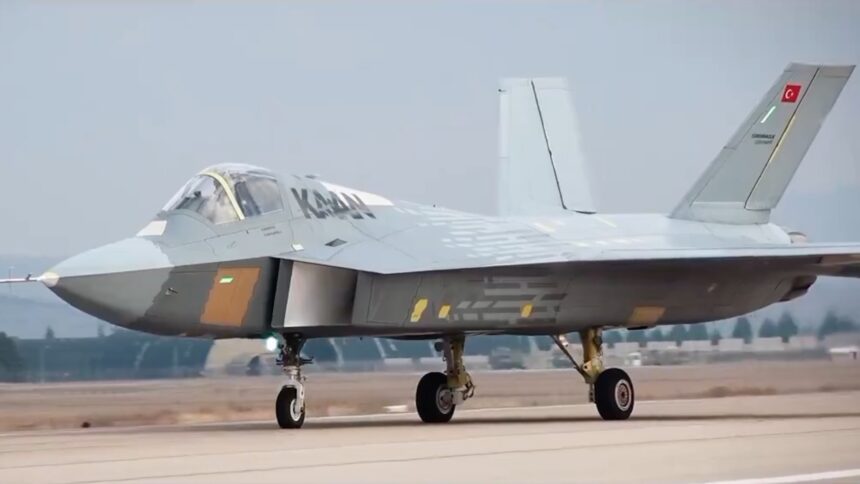Indonesian President Prabowo Subianto announced his country’s interest in joining Turkey’s KAAN fifth-generation fighter jet program, during an official visit to Ankara, signaling a significant deepening of defense cooperation between the two nations. The announcement was made during a joint press conference with Turkish President Recep Tayyip Erdoğan, as both leaders emphasized expanding collaboration in aerospace, submarine technology, and strategic defense.
“Indonesia wants to participate in the development of the fifth-generation KAAN fighter jet as well as submarine development with the Turkish industry,” President Subianto stated, according to Indonesia’s Antara news agency. The visit also saw the signing of new bilateral agreements in culture, media, and disaster management, following 13 cooperation deals signed earlier in February.
The initiative reflects Indonesia’s broader strategy to modernize its aging air defense systems and achieve greater strategic autonomy amid regional tensions in the Indo-Pacific. Subianto’s statement marks a potential turning point in Jakarta’s defense procurement policy, as the country increasingly looks beyond traditional Western suppliers to diversify its defense partnerships.
Turkey’s KAAN Program Gains Global Interest
The KAAN fighter jet, formerly known as TF-X, is being developed by Turkish Aerospace Industries (TAI) as part of Ankara’s push for defense self-reliance. The project was launched in 2011 and gained momentum after Turkey’s removal from the U.S. F-35 Joint Strike Fighter program in 2019, following Ankara’s acquisition of the Russian-made S-400 missile defense system.
Backed by technical support from the UK’s BAE Systems, KAAN is a stealth-enabled, twin-engine fighter capable of flying at Mach 1.8, exceeding the speed of the F-35. It features radar-absorbing materials, AI-assisted combat systems, sensor fusion, and compatibility with unmanned aerial vehicles like Baykar’s “loyal wingman” drones. Its internal weapons bay can carry Turkish-made Bozdoğan and Gökdoğan missiles, maintaining stealth capability while delivering over 18,000 pounds of payload.
The aircraft completed its first test flight in February 2024 and a second in May 2024, validating key design and avionics components. TAI CEO Mehmet Demiroğlu confirmed that operational deliveries to the Turkish Air Force are expected between 2028 and 2029, with long-term plans to incorporate sixth-generation features to ensure future competitiveness.
Jakarta’s Strategic Calculus
Indonesia’s expression of interest in KAAN comes amid efforts to address long-standing issues within its air force, which operates a heterogeneous mix of U.S., British, and Russian aircraft. A 2021 study by Singapore’s S. Rajaratnam School of International Studies (RSIS) highlighted the fleet’s logistical inefficiencies, budgetary constraints, and lack of interoperability, all of which have hindered Jakarta’s air readiness.
Engaging in co-development with Turkey could offer Indonesia a more cost-effective and flexible modernization path, potentially including technology transfer and joint production. It also aligns with Indonesia’s push to diversify its defense partnerships amid intensifying U.S.-China competition in the region.
A New Axis in Defense Cooperation?
President Subianto’s visit follows previous signals of interest in KAAN from the United Arab Emirates and Saudi Arabia, with the latter reportedly considering the acquisition of over 100 units. TAI has confirmed that multiple countries are in talks, though formal partnerships require complex negotiations over technology sharing, industrial offsets, and financial commitments.
If realized, Indonesia’s participation would mark a significant step toward the internationalization of the KAAN platform, positioning it as a multinational alternative to U.S., European, and Russian fighter jets. It would also bring together two emerging regional powers—Turkey from the Middle East and Indonesia from Southeast Asia—in a high-tech collaboration that could shift regional power dynamics.
Challenges Ahead
Despite the promising outlook, questions remain over Indonesia’s ability to finance such an ambitious partnership, Turkey’s industrial capacity to absorb foreign partners, and the technical hurdles that still lie ahead in KAAN’s development. Nonetheless, the intent signals a strategic pivot for both countries.
For Indonesia, the move reflects an ambition to become more self-reliant and assertive in its defense policy. For Turkey, it underscores growing confidence in its defense manufacturing sector and a desire to position KAAN as a cornerstone of future global fighter jet markets.







